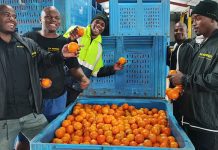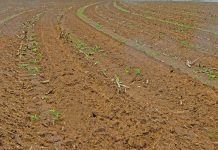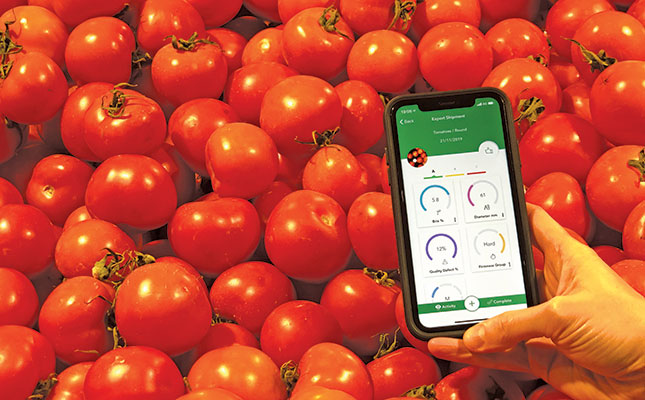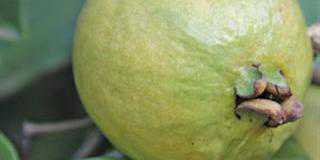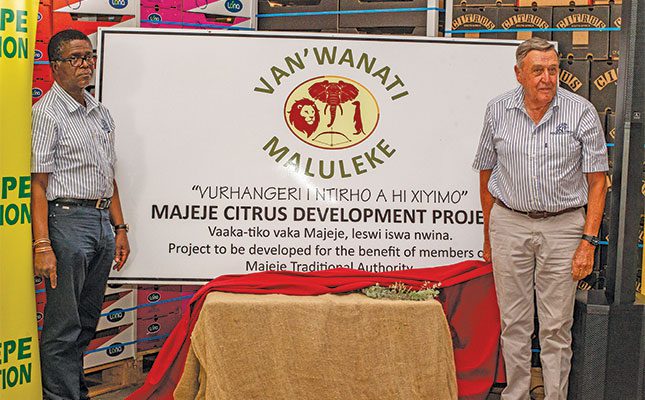
Photo: Magda du Toit
With the support of the Komati Fruit Group, the Motsepe Foundation, Absa, and the Limpopo Department of Agriculture and Rural Development, Majeje Citrus Farm near Letsitele in Limpopo is well on its way to fully participating in one of South Africa’s most thriving agricultural industries – citrus fruit.
Majeje Citrus Farm is among the major players of citrus producers, representing a beacon of hope for the agriculture sector in Limpopo and symbolising a broader vision of economic revitalisation through strategic investments.
Established in 2020, Majeje Citrus (Pty) Ltd in Limpopo is a partnership project between the Majeje Traditional Authority, Komati Fruit Group, and Boela Bruwer, agricultural economist and business adviser.
Piet Smit, CEO of the Komati Fruit Group, explains: “In 2020, the Majeje Tribal Authority contacted us with the view to becoming a partner in this development programme. Mlungisi Ntsanwisi, their current chief or hosi, had a specific strategic vision of how he wanted to manage the communal land, with part of the area earmarked for a commercial citrus farming enterprise and Komati delivering development and managerial services.”
The Majeje tribe and their land
The Majeje tribe can be traced back to 1840. Ntsanwisi took over as hosi from his father, the late Prof Hudson Ntsanwisi, in 1994. Ntsanwisi is a well-known and respected leader in South Africa. The tribe is the de facto owner of the Majeje communal land, which is composed of 29 farms with their subdivisions.
The total area comprises approximately 69 000ha situated in the eastern part of Limpopo. The Majeje community has some 50 000 members located in four villages on Majeje tribal land. The land is utilised for residential purposes, cattle farming, crop farming under irrigation, and nature conservation.
The citrus project’s establishment and financial viability is a testimony of the power of blended finance between government and the private sector, where the Motsepe Foundation and Absa played roles.
In 2022, the project was one of the first to get funding from a joint initiative between the Motsepe Foundation and Agri SA, through its subsidiary Agri Enterprises, and the first citrus trees were planted.
Secrets to success
Speaking during a celebration ceremony for the project in late October, Milaan Thalwitzer, now-retired chairperson of the Komati Fruit Group, said that for any project to be successful, it was imperative to have the most suitable partners that have mutual confidence in the long-term success of the project.
He added that for a project to be viable and sustainable, you have to choose the right funding partners and that training as part of the project was of critical importance.
Dr Langa Simela, business development manager at Absa AgriBusiness, echoed Thalwitzer’s message and said that projects needed finance, security, technical skills, and transparency to succeed.
“It is crucial that the financial situation is managed properly based on a business plan that takes production history into account. Reinvestment is important, but most important of all is to service the loans,” she explained.
The collaboration between government and the private sector on this project is a model of how public-private partnerships can drive development. By aligning the interests of different stakeholders, the project ensures that economic, social, and environmental goals are met simultaneously.
This holistic approach to development is crucial for long-term sustainability and sets a precedent for future projects in the region.
Plans for the project
By focusing on exports, the farm is set to contribute significantly to Limpopo’s GDP while also enhancing South Africa’s position in the global citrus market.
Since 2022, the project has developed and planted 260ha to lemons, Valencia-type oranges, and Star Ruby grapefruit. Over the next few years, they will be expanding to 457ha, with the plan to have 100ha planted to lemons (approximately 36 500 trees), 50ha to Star Ruby grapefruit, and 300ha to Valencia-type oranges.
In addition, the plan also involves utilising 451ha linked to registered water rights from the Great Letaba Irrigation Scheme, and creating permanent and seasonal job opportunities for people in the area.
With the project’s first harvest on the horizon, the potential impact on local and national markets cannot be overstated.
Furthermore, the job creation potential of Majeje Citrus Farm is immense. The anticipated increase in the workforce from the current 70 workers to 400 upon project maturation reflects a commitment to addressing unemployment in the region.
This expansion not only provides livelihoods for hundreds of families, but also offers training and skill development opportunities for the local population.
Economic and environmental contributions
The farm’s growth trajectory underscores the importance of sustained investment in infrastructure and technology to support large-scale agricultural projects. In addition to its economic contributions, Majeje Citrus Farm is poised to make a substantial environmental impact.
The use of solar power and advanced irrigation techniques demonstrates a commitment to sustainable farming practices. These efforts align with global trends towards reducing carbon footprints and conserving water resources in agriculture.
In his address, Ntsanwisi said this project was about pride and putting food on the table.
“The community must benefit from this project,” he said, and stressed that the current role players should be cognisant of the fact that the project was especially focused to benefit the generations to come.
Thalwitzer, however, warned that projects usually failed when greed crept in.
“Citrus is a long-term investment. It can take 10 to 12 years for an orchard to mature, and members should take care to ensure that the money from harvests and sales is reinvested in the business.”
He added that if the members showed patience and kept faith, the reward could be substantial.
If the project progresses as planned, it will likely inspire similar initiatives across the province and beyond, setting new standards for environmentally responsible farming.
As Majeje Citrus Farm continues to grow, it will undoubtedly serve as a catalyst for further agricultural innovation and economic diversification in Limpopo.
Email Llandi van der Walt at [email protected].



